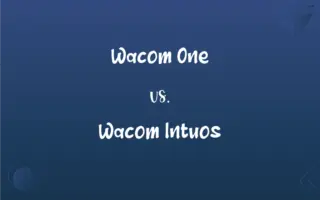Organizational Learning vs. Learning Organization: What's the Difference?
Edited by Aimie Carlson || By Harlon Moss || Published on February 10, 2024
Organizational Learning refers to the process of creating, retaining, and transferring knowledge within an organization. Learning Organization is a company that facilitates the learning of its members and continuously transforms itself.

Key Differences
Organizational learning focuses on the process of learning within an organization, emphasizing knowledge acquisition and sharing. Learning organizations are entities that embody a culture of continuous learning and adaptability.
Organizational learning is about how organizations learn and improve over time through experiences and practices. A learning organization is structured to foster learning, with mechanisms to facilitate and encourage employee growth and development.
In organizational learning, the emphasis is on enhancing the organization's knowledge base and skills to improve performance. Learning organizations prioritize creating an environment where learning is embedded in the culture and operations.
Organizational learning often occurs in response to specific challenges or changes in the external environment. Learning organizations, however, proactively pursue learning and development as a continuous, strategic approach.
The outcome of organizational learning is a more knowledgeable and skilled workforce. For learning organizations, the benefit is a flexible, innovative, and competitive organization.
ADVERTISEMENT
Comparison Chart
Definition
Process of acquiring and sharing knowledge
Culture that promotes continuous learning and adaptation
Focus
Improving knowledge and skills
Creating a learning-centric environment
Strategy
Reactive to specific needs
Proactive and integral to operations
Purpose
Enhance performance and capabilities
Encourage growth, innovation, and adaptability
Outcome
Knowledgeable workforce
Flexible and competitive organization
ADVERTISEMENT
Organizational Learning and Learning Organization Definitions
Organizational Learning
Adaptability to Change.
The firm's commitment to organizational learning helped it navigate market shifts.
Learning Organization
Employee Growth.
In our learning organization, each employee has a personalized development plan.
Organizational Learning
Continuous Improvement.
Organizational learning is key to our process of continuous improvement.
Learning Organization
Organizational Transformation.
Our transition to a learning organization has fostered greater collaboration.
Organizational Learning
Knowledge Acquisition.
Organizational learning enabled the company to adapt to new technologies swiftly.
Learning Organization
Innovation Focus.
Being a learning organization allows us to stay ahead in innovation.
Organizational Learning
Skill Enhancement.
Through organizational learning, employees improved their analytical abilities.
Learning Organization
Culture of Learning.
Our company is a learning organization, always encouraging employee development.
Organizational Learning
Experience Sharing.
Organizational learning involves sharing best practices among teams.
Learning Organization
Adaptive Structure.
As a learning organization, we regularly update our training programs.
FAQs
What’s the key characteristic of a learning organization?
A culture that prioritizes continuous learning and adaptability.
What defines a learning organization?
A company that facilitates its members' learning and continuously transforms itself.
How does organizational learning occur?
Through experiences, training, and knowledge sharing.
Can small businesses practice organizational learning?
Yes, it's scalable to any size of organization.
Are all companies learning organizations?
No, only those that embed learning into their culture and operations.
What is organizational learning?
It's the process of creating, retaining, and transferring knowledge within an organization.
How does technology impact a learning organization?
It enables more efficient learning and knowledge management.
What’s the benefit of organizational learning?
Improved performance and competitive advantage.
How does a learning organization support innovation?
By encouraging experimentation and knowledge sharing.
What role do leaders play in organizational learning?
They set the vision and facilitate learning opportunities.
What challenges face a learning organization?
Maintaining a balance between learning and operational efficiency.
Can a traditional organization transform into a learning organization?
Yes, with commitment to cultural and structural changes.
Is organizational learning a one-time event?
No, it's a continuous process.
How do employees benefit from organizational learning?
Through skill development and career growth.
How do you measure organizational learning?
Through performance metrics and employee competence assessments.
Does a learning organization promote collaboration?
Yes, it often leads to more teamwork and collaborative learning.
Does organizational learning require technology?
Technology can facilitate it, but it's not always required.
Can organizational learning lead to cultural change?
Yes, it can significantly influence organizational culture.
Is a learning organization more suited to certain industries?
It's beneficial in all industries, especially in rapidly changing ones.
Do learning organizations have a competitive edge?
Yes, due to their adaptability and innovative culture.
About Author
Written by
Harlon MossHarlon is a seasoned quality moderator and accomplished content writer for Difference Wiki. An alumnus of the prestigious University of California, he earned his degree in Computer Science. Leveraging his academic background, Harlon brings a meticulous and informed perspective to his work, ensuring content accuracy and excellence.
Edited by
Aimie CarlsonAimie Carlson, holding a master's degree in English literature, is a fervent English language enthusiast. She lends her writing talents to Difference Wiki, a prominent website that specializes in comparisons, offering readers insightful analyses that both captivate and inform.








































































